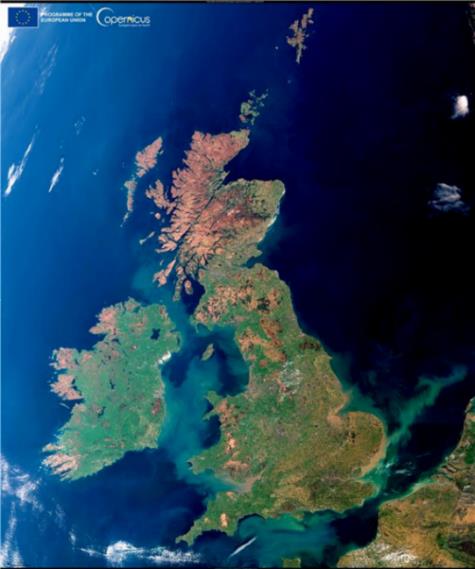
Statement of the United Kingdom
Group on Earth Observations – GEO Global Forum 2025 & GEO-20 Plenary
Statement of the United Kingdom
The United Kingdom (UK) has long been at the forefront of Earth Observation technology, research, and collaboration, significantly bolstering the national economy and positioning itself as a global leader in addressing environmental and climate change-related challenges. Earth Observations are crucial to support the UK government's clean energy superpower mission, providing monitoring capabilities that address various social issues, including air quality interventions, planning optimal and efficient solar power generation, and guiding urban planning to design safer public spaces.
The past few years have seen significant developments in the UK Earth Observation (EO) sector and the UK government has continued to support its long-term growth. This dedication has resulted in significant contributions to the national economy, with data and services from EO satellites supporting approximately £109 billion of the UK GDP, accounting for 4.8% of the total GDP.

Our re-participation in the Copernicus component of the EU Space Programme in January 2024 provides new opportunities for the UK Government, the EO sector, researchers, and the public. This is timely: the Copernicus constellation is essential to global efforts to address environmental and climate change-related challenges. The UK's involvement enables its EO sector to bid for contracts to design and deliver Copernicus technology, operate and manage data, and develop services and data products using the Copernicus space system. We are very interested to understand the Commission’s proposals for Copernicus from 2028 onwards.
The UK also continues to develop innovative ways to facilitate better access to EO data, working on space data architecture, and by creating a platform to integrate public data with commercial data sources. The goal is to improve access to trusted EO data to provide better and more efficient public services, support international harmonization and operability, and facilitate the creation of new commercial products and services in the UK and internationally.
Using Space Technology and EO to support Climate solutions
In our ongoing efforts to leverage space technology for climate solutions, the UK is actively involved in the development and exploitation of two significant Earth observation missions: Biomass and MicroCarb. Biomass, scheduled for launch on 29 April 2025, is an ESA Earth Explorer satellite mission conceived and built in the UK. This mission will use advanced P-band radar technology to provide new insights into forests, global climate change strategies, and conservation efforts. MicroCarb, set for launch on 25 July 2025, is a collaborative mission between the UK Space Agency and CNES. It aims to measure sources and sinks of carbon, the primary greenhouse gas driving global warming.
These missions will not only offer free and open data for exploration by the GEO community, but it will enhance existing datasets related to carbon and water cycles, such as above-ground biomass, which are crucial for planning mitigation, adaptation, and early warning strategies. The UK EO community is eager to support GEO in making effective global contributions in areas like forests, heat-health, and disaster management, while also acknowledging and supporting the growing focus on biodiversity worldwide.

UK Chair of the Committee of Earth Observation Satellites (CEOS)
The UK remains committed to advocating for climate action through its active participation in CEOS. The UK Space Agency is chairing CEOS in 2025 under the theme 'Unlocking Earth Observation for Society'. The focus will be on promoting best practices in satellite-based methane emission measurements, supporting the use of EO data in the Global Stocktake process, and enhancing EO data usage in public services. In alignment with the GEO Youth Voice, the UK Space Agency has also introduced the pilot initiative ‘CEOS in Schools’, which aims to bring together students from around the world to learn about EO, collaborate, and engage with CEOS Principals.
Through CEOS, the UK and NASA are working together with our other international partners such as JAXA and ESA to establish best practices for measuring methane emissions from satellites at the facility scale. These best practices will be used globally to ensure the data is accurate and useful, helping to underpin international efforts to monitor and reduce the impact of methane on climate change.
UK innovation in EO
The UK EO community has also been engaged in several exciting projects, including our pathfinder EO Data Hub, which aims to enhance the connections between satellite data providers and the information flows that support improved policy and business functions. In the agricultural sector, efforts are focused on predicting crop yields and providing earlier forecasts of potential scenarios. Additionally, research on climate change in the UK, such as heatwaves and droughts, is aimed at integrating high-quality land surface temperature data with climate model predictions and enabling the UK Health Security Agency and the Met Office to launch a heat-health alert service in the UK.
UK commitment to GEO
The UK has witnessed GEO's dedication to significant climate action initiatives and can affirm the UK's sustained support for GEO, the post 2025-Startegy ‘Earth Intelligence for all’ and its work programmes. The UK looks forward to continued participation in GEO and contributing to its governance, working groups, and various Work Programme initiatives and activities. This engagement provides significant benefits for all members by enabling international collaboration, facilitating discussions on analysis-ready data and open science, and sharing valuable insights with other nations.
The UK is actively participating in several GEO activities, including the GEO Ecosystem Atlas, GEOGLAM, and GEO-TREES, and acknowledge the progress made in these programmes. The GEO Ecosystem Atlas supports the UK's biodiversity strategy and action plan by integrating satellite, in situ, and airborne data into woodland and habitat maps to monitor changes over time. GEOGLAM aids food security by providing satellite data and services with derived products, especially in areas like crop yields and surface temperature for evapotranspiration. This Programme enables the UK to support our drought service to Africa using soil moisture data. GEO-TREES promotes fair data policies that support and reward in-country researchers, particularly in the global south, where most tropical forest biomass is located.
EO data continues to have a huge potential to facilitate progress and inform decisions to address the global challenges we face today, providing reliable and credible data as the world tackles climate change, biodiversity loss, natural and man-made disasters. The UK is dedicated to being at the forefront of EO technology, research and collaboration, working with existing and developing new partnerships and continuing its strong relationship with EuroGEO and GEO to support our shared ambitions.
